Dr Aziz Ahmad Hafiz, Chairman Humanity First UK
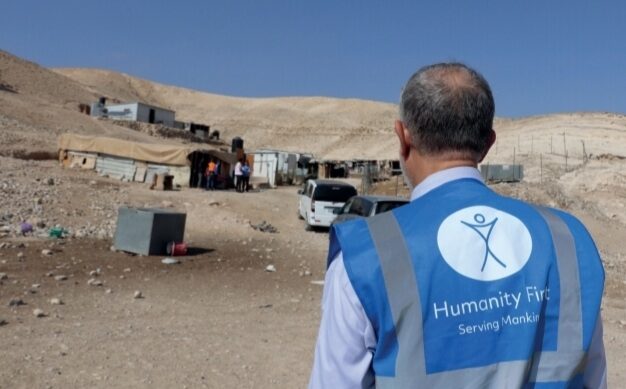
Towards the end of last year, Humanity First UK was fortunate to be able to visit Gaza and the West Bank in Palestine to review some of our humanitarian projects for the Palestinians.
The West Bank, including East Jerusalem, and the Gaza Strip are together known as the Occupied Palestinian Territories, OPT.
Following the Hamas takeover of the Gaza Strip in 2007, it has been under an air, land and sea blockade by Israel, severely restricting the entry of goods and fuel into Gaza, the export of produce from Gaza and the movement of people between Gaza and the West Bank.
The Gaza Strip is only 25 miles long and between 3.7-7.5 miles wide. It has a population of just over two million people of which 1.4 million are refugees. Over 80% of the population is dependent on international assistance. Despite having a highly skilled and educated population, especially women, due to the economic and humanitarian situation, the unemployment rate is at 50%.
The West Bank has a population of 3.3 million people with an area of 2000 square miles however Palestinians are only permitted to live on 39% of the area (Areas A & B).
Prior to the visit, I was fortunate to be able to seek guidance from Hazrat Mirza Masroor Ahmad, Khalifatul Masih Vaa on our itinerary, plans and objectives which as always proved invaluable in guiding us to ensure we work with equity, justice and compassion. I was able to request prayers for some challenges we were facing with visas and entry permits to Gaza.
On 1 November 2021, Mohammad Malas Sahib and I landed safely in Tel Aviv, Israel and spent the night in Kababir, Haifa at the headquarters of the Ahmadiyya Muslim Community.
First thing Tuesday morning, we headed for Ramallah in the West Bank where first on the agenda was a meeting with the President of the Al Quds Open University and his senior team where we discussed Humanity First’s latest project, an IT Lab for the visually impaired in Gaza.
The team was very grateful for the support to create this new facility and we received positive public feedback including from a Palestinian Christian pastor who stated:
“God bless all your great work, it is excellent what you do, may God Almighty be with you every step of the way. May all your future projects be successful. May God always bless you and protect you and take care of your NGO. Together hand in hand we can give hope for successful progress in serving humanity.”
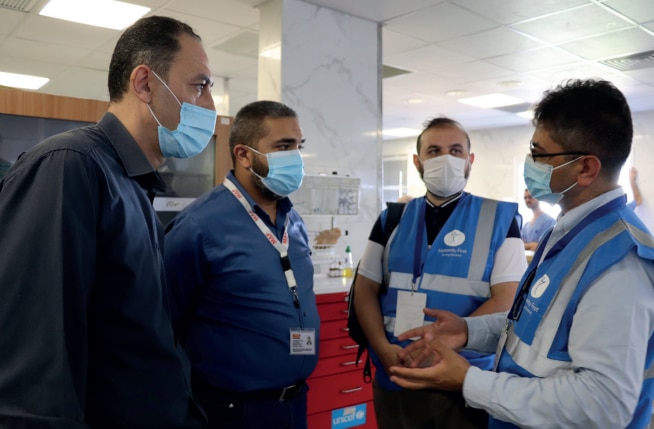
To ensure efficient use of our time, the schedule was packed with various meetings discussing ongoing humanitarian needs and projects.
The following day, we witnessed the extreme poverty and the humanitarian situation amongst Bedouins living in the Jordan Valley just west of the Dead Sea. Families lived in makeshift shacks in poor conditions with no access to electricity, water, or health facilities. Bedouin families here have their tents and makeshift homes constantly uprooted as they struggle with their daily lives.
Young children played innocently on the rocky terrain, their smiles camouflaging the abject poverty they were living in.
By the grace of Allah the Almighty, our entry permits for Gaza were eventually approved by the Israeli authorities and we were able to proceed with our plan to visit and were joined by our third team member Jamal Akbar Sahib.
On the morning of 8 November 2021, we travelled from Jerusalem to the Erez checkpoint crossing into Gaza. After going through the necessary security and entry formalities, we finally entered Gaza at 11 am for the first time.
The contrast was immediately apparent as we drove through Bait Hanoun, Bait Lahia and Jabaliya in the North of Gaza witnessing the dilapidated infrastructure, damaged buildings, roads with potholes and open sewers in camps. In many of the overcrowded camps and residential areas, it felt as if we had gone back in time many decades.
Walking through the streets you are constantly reminded that you are in Gaza by the buffer zone, the security wall and surveillance balloons as well as the humming of drones.
Over 1 million of Gaza’s 2 million population are refugees and the worst conditions we witnessed were arguably in what is called locally as the “Swedish Village” in Rafah in southern Gaza next to the Egyptian border.
The area was built in 1965 by Swedish forces and houses some 1700 residents living in cramped makeshift units open to the elements in both winter and summer.
As we walked through the narrow-unpaved country streets, the smell of raw sewage hit me instantly. The sanitation infrastructure is minimal here and with regular power outages, raw sewage is forced to be pumped out into the Mediterranean Sea to avoid it overflowing into people’s homes, which it does at times.
Children played on the beach oblivious to the raw sewage pouring onto it around them. Many of the children here suffer from skin conditions and gastric infections linked to poor sanitation, pollution and swimming in the dirty sea.
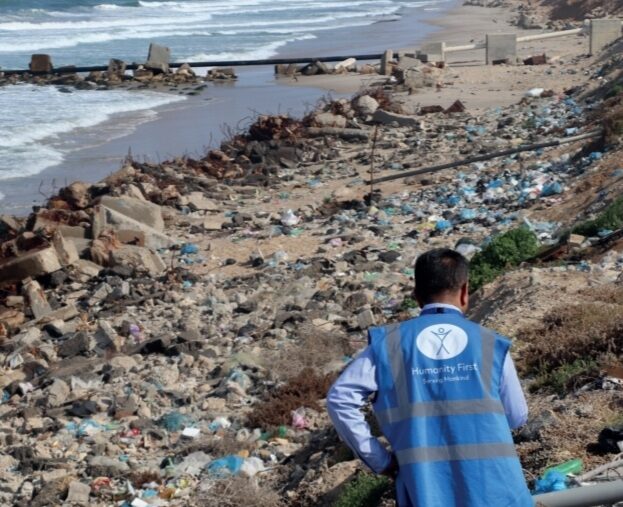
The United Nations stated in 2011 that by 2020 Gaza would become unliveable. We are past that point, and everything seems on a knife-edge as the woefully inadequate infrastructure struggles to meet the demands of the population. Several factors including the poor sewage network, lack of materials to repair damage to pipes due to the blockade, regular power outages, the polluted Gaza Aquifer have all led to a situation where 97% of the water in Gaza is unfit to drink.
It is hard to imagine without experiencing with your own eyes how difficult life is for the families living here for the last 50+ years. For families who are refugees with nowhere in the world to go, this filthy camp is their home.
As we drove from one village to another, we witnessed first-hand the infrastructure challenges as the main water main carrying water from east to west Rafah for over 40,000 people had blown due to the phenomena called “water hammer” whereby power outages cause turbulence in closed water systems and the weak pipes blow.
The engineers we met said this was the second time in two weeks this main had blown and it was an almost weekly occurrence as due to the 15-year blockade they didn’t have adequate materials to make the temporary repairs nor the gate valves to release any pressure build-up.
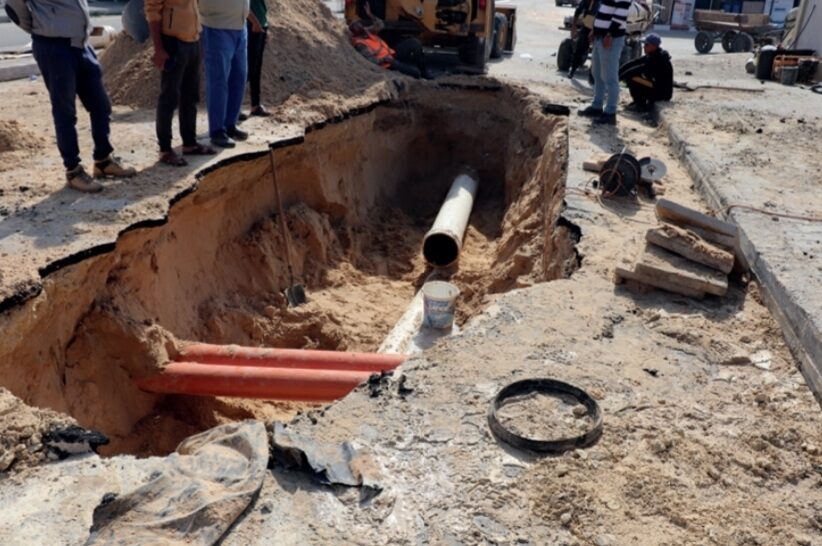
The situation was no better in the next village, Aroiba, that we visited. Again, families living in ramshackle homes made from whatever shelter they could find. Children foraged through refuse to see what they could find to sell so they can support their families.
In this challenging situation, Humanity First, by the grace of God Almighty, working with its partner ANERA was able to provide two reverse osmosis water desalination units at the Friends Benevolent Society Hospital in Gaza City as well as the Al Huda clinic. Together these units provide fresh clean water for over 11,000 people each month including a public fountain allowing open access to all.
Together with water and sanitation, another major issue for the residents of Gaza is unemployment and food security. Working with ANERA we were able to provide rooftop gardens for extended families which allow them to grow vegetables using hydroponic techniques to not only provide food for their families but also to sell on.
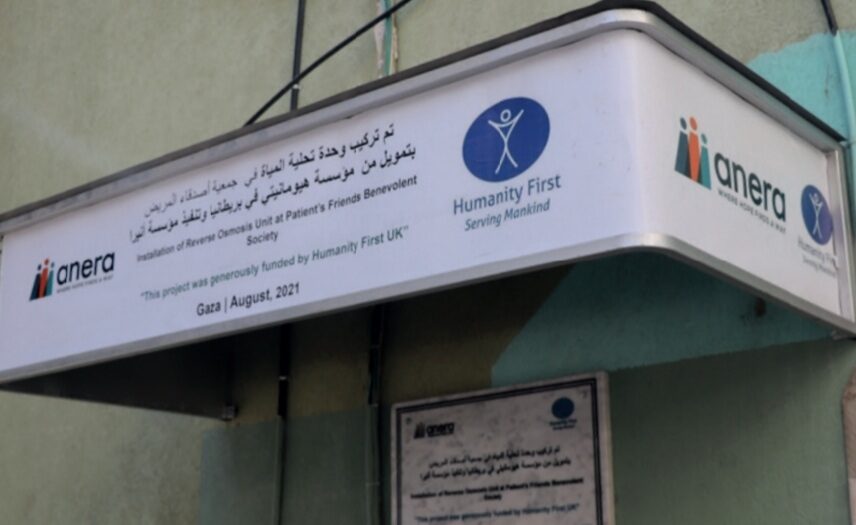
The humanitarian situation in Gaza takes its toll on the most vulnerable namely those with disabilities or learning difficulties due to limited resources and facilities.
Humanity First has been able to establish an IT lab for the visually impaired in North Gaza. This lab will be open to students and the public and includes the latest braille technology equipment, from braille printers, software, computers etc to open the outside world to those who would otherwise be severely restricted due to their disability.
Medical Support is another major humanitarian need in Gaza and Humanity First with the support of its donors was able to assist during the May 2021 emergency with vital medication, oxygen, and dialysis filters for the Al Shifa Hospital through its partner Medical Aid for Palestinians (MAP). Our long-term support consists of capacity building and training to assist the clinicians to keep updated as they are unable to leave Gaza due to the blockade.
As we continue our efforts in Palestine, Africa and beyond, we are grateful for the support of our donors and would urge you to keep in mind the countless people around the world we try to assist by visiting www.hfuk.org/donate.


Step by step Humanity First is signing it’s name among the major actors & the international relief responders.
With a true empathy & love for mankind in one hand & seeking only Allah’s acceptance in the other, our efforts will always be devoted for the good of humanity & to please Allah سبحانه وتعالى
Allah Bless you for the incredible efforts you are making in such difficult circumstances. Our hearts and prayers go out to the forgotten people of Palestine. May Allah ease their plight and show them a peaceful way out of this desperate situation
May Allah help Humanity First help our brothers & sisters of Palestine! May Allah remove the hardship they have been enduring for many years. May Allah guide them to see the true light of Islam, ameen.